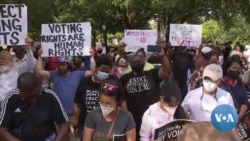Thousands of people will march on the National Mall in Washington, D.C. on August 28 to mark the 58th anniversary of Martin Luther King Jr.’s “I have a dream” speech with a demand for voting rights legislation.
In the wake of the hotly contested results of the 2020 presidential election, Democrats and Republicans are locked in a battle to reshape state and federal voting rights laws to better position themselves for future elections.
Republican state legislators throughout the country, making baseless claims that former President Donald Trump was cheated out of a second term, have rushed to enact highly restrictive state laws to prevent fraud at the ballot box. Democrats insist many of these measures are unwarranted moves that could deny millions of Americans the right to vote and have sought to block them through congressional action.
Democrats have responded by promoting bills at the federal level that would roll back many of the Republicans’ state-level bills. But despite the Biden administration’s vows to fight for the bills – which are stalled in the evenly divided U.S. Senate -- they are unlikely to advance.
The fight over voting rights is just the latest casualty of the partisan political divide in the country. In June, Senate Republicans blocked debate on the U.S. House-passed “For the People Act,” which would amount to the largest overhaul of the U.S. election system in a generation. The bill, HR 1, would, among other things, end the gerrymandering of Congressional districts, overhaul campaign contribution laws, and protect voting rights.
Vice President Kamala Harris told reporters after the bill was blocked, “This is about the American people's right to vote unfettered, it’s about their access to the right to vote in a meaningful way, because nobody is debating whether all Americans have the right to vote. The issue here is their actual access to the voting process.”
But many analysts say the federal bill will remain blocked unless Democrats take the serious step of ending the filibuster rule in the Senate, which requires a three-fifths majority to advance most legislation.
In a chamber divided 50-50, with Vice President Harris casting the tie-breaking vote, the Democrats would need the support of at least 10 Republicans in order to bring their bill to a vote.
Liberal Democrats and others have urged the Senate Democratic leadership to eliminate the filibuster rule in order to pass election reform and other pieces of the Democratic agenda. But until now, President Biden and two Democratic senators have opposed that approach.
Changes to voting laws on the state level have been picking up steam. According to the Brennan Center for Justice, seventeen states have passed 28 laws with new restrictions on voting this year, since Trump claimed the 2020 election was “rigged” against him.
In July, more than 50 Texas House Democrats risked arrest by fleeing the state to prevent the Republican-controlled legislature from passing a voting law bill they argued restricted minority rights. They fled to Washington, D.C., calling on Congress to renew efforts to pass national voting rights legislation.
Rebekah Caruthers, vice president of the Fair Elections Center, said federal legislation would help address the situation in Texas and other states.
“The For the People Act and the John Lewis Voting Rights Advancement Act will actually look for ways to modernize how we do our elections, and then also to make sure that marginalized groups who have been discriminated against historically are able to vote,” she said.
The 2020 presidential election saw record turnout. According to the Pew Research Center, nearly two-thirds of eligible voters cast a ballot, the highest share since the 1900 election. Congressional Democrats and some analysts contend this is the reason for the acceleration in Republican-controlled states passing voting restrictions.
“Instead of looking for ways to increase the right to vote, and to increase civic participation in this country, we see one political party trying to decrease the people who showed up to vote in 2020. Simply put, we see that the Republican Party doesn't want the same 2020 voters to show up in 2022,” said Caruthers.
But Senate Minority Leader Mitch McConnell and other Senate Republicans have criticized the Democrats’ legislation, arguing there is broad support for common-sense laws that protect election integrity.
“Americans want to make it easy to vote and harder to cheat,” McConnell said on the Senate floor in July. Citing one provision of the proposed Texas legislation, he added, “Voter ID, for example, is popular with majorities of black, white, and Hispanic Americans.”
Conservative analysts say Democratic legislation would lead to dangerous federal overreach in the oversight of elections.
“The states are each responsible for running their elections. This bill — HR 1, which Democrats are urging Congress to pass, would lead to a federal takeover of the administration of elections across the country,” said Hans von Spakovsky, manager of the Election Law Reform Initiative at the Heritage Foundation.
“It has many other changes that in essence get rid of the kind of basic security and safety protocols and measures that states put in place to try to safeguard the integrity and security of the election process,” he said.
In July, the U.S. Supreme Court handed down a 6-3 decision in Brnovich vs. Democratic National Committee that limited Section Two of the landmark 1965 Voting Rights Act. Section Two prohibits voting practices or procedures that discriminate on the basis of race, color or membership in a minority language group.
Arizona Attorney General Mark Brnovich said the Supreme Court decision preserved state-level efforts to protect election integrity.
“These measures are designed to preserve order and secure the elections and provide confidence in the results,” he said.
But Caruthers noted: “We see that Section Two has been used in the past to make sure that those who experienced voter suppression are able to take their case to court and to make sure that they're actually able to access the ballot box. But what we see is that there's a movement across the country, with the Supreme Court as well as with the majority of state legislators, to actually make it harder for these marginalized groups to vote.”
Public opinion polling shows Americans support elements of both sides’ arguments. A June 2021 Monmouth University poll showed that 71% of people support early voting while 80% supported showing some kind of identification in order to vote. The respondents were equally divided when it came to easing access to vote by mail.
But Democrats argue the For the People Act represents an even broader overhaul of American elections and government that will drive passage of voting rights legislation.
In a recent event with watchdog organization Common Cause, Senator Jeff Merkley, a Democrat from Oregon, said: “If you just poll people across the nation, Republicans and independents and Democrats, they all want to take on gerrymandering. They all want to take on dark money that allows billionaires and corporations to buy elections. They all want to protect the ballot boxes, the pulsating heart of our republic.”







